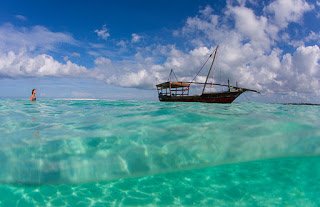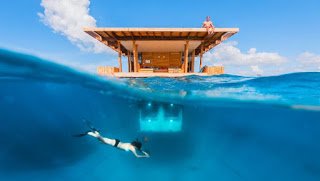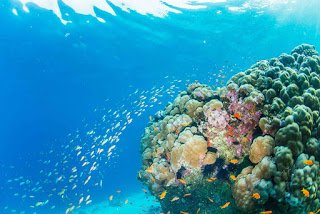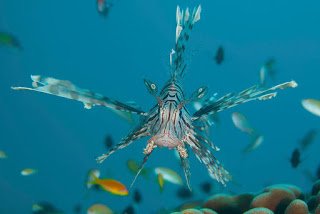The Manta Resort’s underwater room has helped to create awareness concerning the plight of the coral reefs around Pemba Island. The reefs are a vital part of the welfare to all that live on the island. With this new awareness, along with input from local residents, The Manta Resort gained buy in from the Minister of Fisheries, Pemba Channel Conservation Area management and local fishermen to protect the reefs.
A small no netting conservation area was agreed upon in 2012 and implemented on the arrival of the underwater room in November 2013. The aim of was to prevent the pulling of nets over the reefs, which results in their destruction, and also to allow juveniles of over 200 marine species to grow and reproduce. This has been a major success in that the conservation area is now a breeding ground that has proven results.
Guests at The Manta Resort can ‘Snorkel for Conservation.’ This activity supports the 1 kilometer Kwanini Marine Conservation Area (KMCA) directly in front of the lodge. The cost is $15pp, and all revenues go to support the KMCA. The ‘house reef,’ directly in front of the resort, lies within the conservation area. Travelers can experience the vast numbers of marine life and reefs through the clear blue waters of Pemba Island in Manta’s chosen snorkeling spots. Guests are taken out with a guide and shown the colorful, vibrant life lying just under the surface.
Pemba’s Conservation History
 The northernmost island of Tanzania’s Zanzibar archipelago, Pemba lies approximately 50 km east of mainland Tanzania. It is home to a rich diversity of tropical marine habitats, including extensive coral reefs, sea grass meadows and mangrove forests. While much of the terrestrial environment has been degraded due to land clearance for agriculture and human habitation, the island’s marine resources remain relatively healthy. The reefs surrounding the island are among the healthiest and most diverse in East Africa, and have been identified as a priority area for conservation by the International Union for Conservation of Nature.
The northernmost island of Tanzania’s Zanzibar archipelago, Pemba lies approximately 50 km east of mainland Tanzania. It is home to a rich diversity of tropical marine habitats, including extensive coral reefs, sea grass meadows and mangrove forests. While much of the terrestrial environment has been degraded due to land clearance for agriculture and human habitation, the island’s marine resources remain relatively healthy. The reefs surrounding the island are among the healthiest and most diverse in East Africa, and have been identified as a priority area for conservation by the International Union for Conservation of Nature.
Local communities are reliant on Pemba’s coastal and marine ecosystems for their livelihoods, with fishing and aquaculture being important sources of income for coastal villages. In 2005, the Government of Tanzania created the Pemba Channel Conservation Area (PECCA) in order to protect the outstanding biodiversity of the Pemba Channel and enhance the contribution of marine and coastal resources to economic growth, while also reducing poverty on the island.
After the funding period ended in 2010, financing for the continuation of PECCA was intended to be maintained through a tourism entry fee system. To date, revenues from entry fees have been insufficient to sustain PECCA’s previous donor-funded work programs, resulting in a considerable reduction in the level of conservation activities. Interested in supporting community-based marine conservation initiatives, and recognizing PECCA’s limited capacity to provide support to local marine conservation efforts, The Manta Resort investigated how they might help.
In late 2013, The Manta Resort did a scoping trip in order to review the potential for a community-based marine conservation in the coastal area surrounding the resort. The Manta Resort created a no-take-zone (NTZ) and the Kwanini Conservation Area (KCA). Over a period of three days, consultations were held with local community members and fisheries stakeholders, and an exploratory dive was conducted to gain a stronger understanding of the health of the marine environment in question.
Key recommendations were agreed upon, resulting in transformation of a 1km coastline in front of The Manta Resort into a breeding zone called the Kwanini Marine Conservation Area – KMCA. The Manta Resort works closely with the Pemba Channel Conservation Area – PECCA to help conserve the Pemba Channel Marine ecosystem. This no-netting area of approximately 100,000 sqm has seen tremendous growth in biodiversity, coral regeneration and fish populations. Guests benefit in being able to explore this underwater paradise, as well as contribute to its preservation through stays at The Manta Resort.






Leave A Comment
You must be logged in to post a comment.